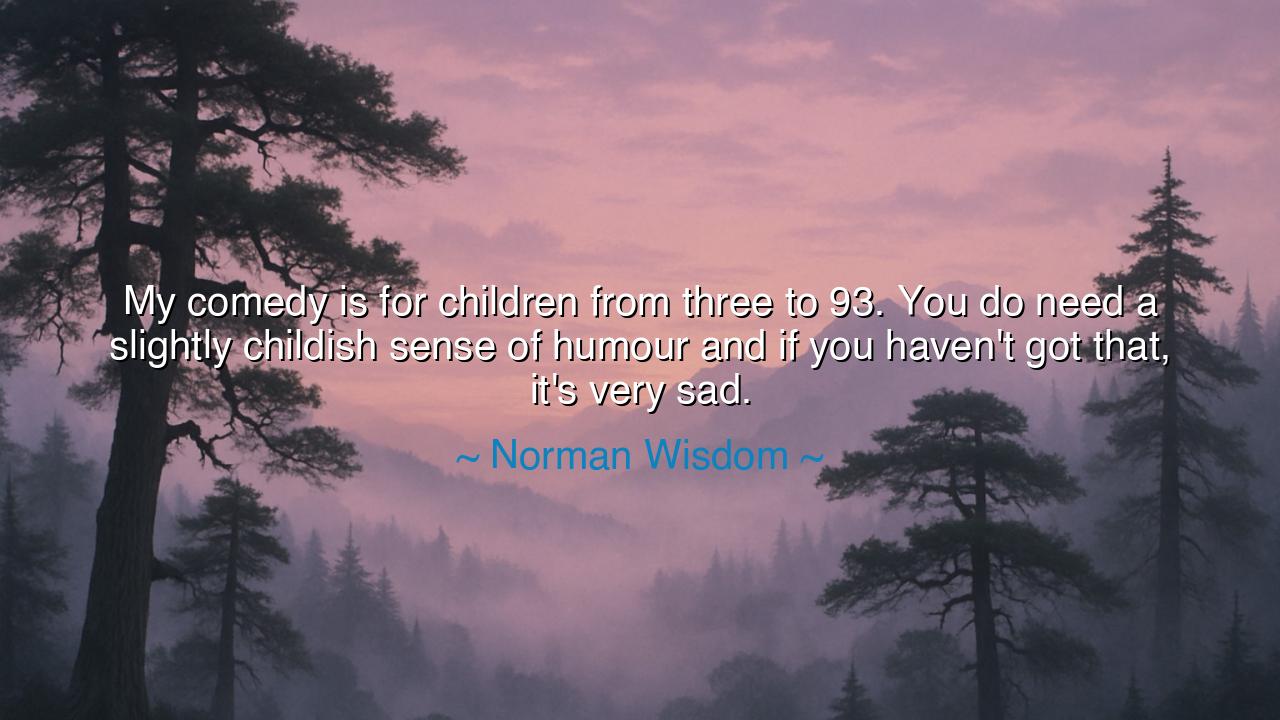
My comedy is for children from three to 93. You do need a
My comedy is for children from three to 93. You do need a slightly childish sense of humour and if you haven't got that, it's very sad.






The words of Norman Wisdom sparkle with lighthearted truth, yet carry a depth of ancient wisdom: “My comedy is for children from three to 93. You do need a slightly childish sense of humour and if you haven’t got that, it’s very sad.” Here, the great clown reminds us that joy, laughter, and playfulness are not ornaments of life but its very lifeblood. For the one who cannot laugh, who has lost the childish sense of humour, is poorer than the one who has lost gold or power. To laugh is to live; to lose laughter is to wither long before death arrives.
The origin of this truth lies in Wisdom’s own life and craft. Rising from hardship, from poverty and struggle, he turned not to bitterness but to laughter. His comedy, built upon pratfalls, innocence, and mischief, was not the laughter of cruelty or scorn but of innocence reborn. He knew that the childlike spirit remains alive in every heart, though often buried beneath years of care and labor. His art was to awaken it again, reminding both the young and the old that laughter is timeless, and that the soul never truly grows old when it can still find delight in simple things.
The ancients, too, revered this truth. Aristotle himself, while praising tragedy for its ability to purge the soul, also spoke of comedy as a mirror of life’s lighter side. And in many cultures, the fool was not despised but revered, for he carried a sacred role—the bringer of laughter, the disrupter of pride, the healer of heavy hearts. Even kings, crowned in majesty, kept jesters by their sides, not because they lacked power, but because they knew power without laughter leads to tyranny of the spirit.
History offers us the tale of Charlie Chaplin, whose silent films brought laughter during the dark days of the Great Depression. His character, the Little Tramp, was clumsy, poor, and mocked by circumstance, yet always resilient, always able to laugh and rise again. Like Norman Wisdom, Chaplin appealed to all ages, for he touched the eternal child within. His comedy, too, was for children from three to 93, and in it we see proof that the laughter of innocence is the most universal of all human languages.
Wisdom’s words also carry a note of sorrow: “If you haven’t got that, it’s very sad.” For he knew that many lose this lightness as they grow older, weighed down by duty, disappointment, or cynicism. To lose the child within is indeed a tragedy, for then even joy appears foolish, and beauty seems naïve. Without laughter, the heart hardens, and life becomes a gray passage rather than a dance. His lament is not only for lost humour but for lost humanity.
The lesson for us is clear: guard your sense of humour as you would guard a treasure. Do not let the years steal from you the capacity to laugh at yourself, to find delight in the ridiculous, to see the world not only through weary eyes but through playful ones. For laughter is a medicine, softening sorrow, binding hearts, and reminding us that we are more than our burdens.
Practical action lies within reach: allow yourself to be silly sometimes. Laugh with children, laugh at small mishaps, laugh at life’s absurdity. Seek out comedy that uplifts rather than destroys, that reminds you of innocence rather than mocks it. And when the world feels heavy, remember that even in sorrow, a smile can be an act of defiance, a refusal to let despair have the final word.
So let us remember Norman Wisdom’s truth: comedy belongs to every age, and the childish sense of humour is a gift not to be lost. To laugh is to live fully, to carry the flame of joy from youth into old age. And when we guard that flame, we ensure that even in the darkest times, the heart remains young, and the soul remains free.






AAdministratorAdministrator
Welcome, honored guests. Please leave a comment, we will respond soon